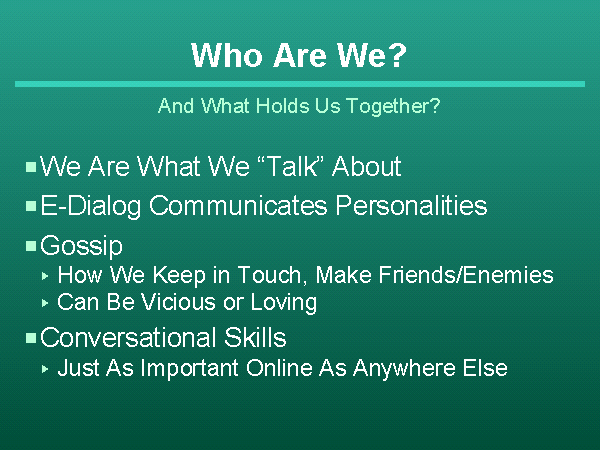





 Notes:
Notes:
Rheingold says: "People in virtual communities use words on screens to exchange pleasantries and argue, engage in intellectual discourse, conduct commerce, exchange knowledge, share emotional support, make plans, brainstorm, gossip, feud, fall in love, find friends and lose them, play games, flirt, create a little high art and a lot if idle talk."
He notes: "Many people are alarmed by the very idea of a virtual community, fearing that it is another step in the wrong direction, substituting more technological ersatz for yet another natural resource or human freedom." However, he argues: "Those who critique CMC because some people use it obsessively hit an important target, but miss a great deal more when they don't take into consideration people who use the medium for genuine human interaction."
Horn says: "In cyberspace we have a running commentary on ourselves and our culture and all we know and don't know, which connects us to ourselves and each other, and everything in front of us. All the power and the allure of virtual communities is in this ongoing, evolving commentary, and the bonds that knock-down, drag-out fights that invariably arise when you give people a place to talk for as long and often as they like. The conversations we have online are our identity." (p. 70)
In effect, this dynamic sounds very much like the practical application of the concept of "push-back" referenced by Charles Savage in his book entitled "5th Generation Management: Co-creating Through Virtual Enterprising, Dynamic Teaming, and Knowledge Networking." Savage says: "The truth is often buried in the confluence of a variety of human perceptions. Only through the give-and-take of hard dialog can it be discovered... When someone makes a statement or takes a position, others are expected to push back until the truth of the matter is discovered... A push-back is not a put-down, but signifies an openness and willingness to stick with an issue until the truth is known."















